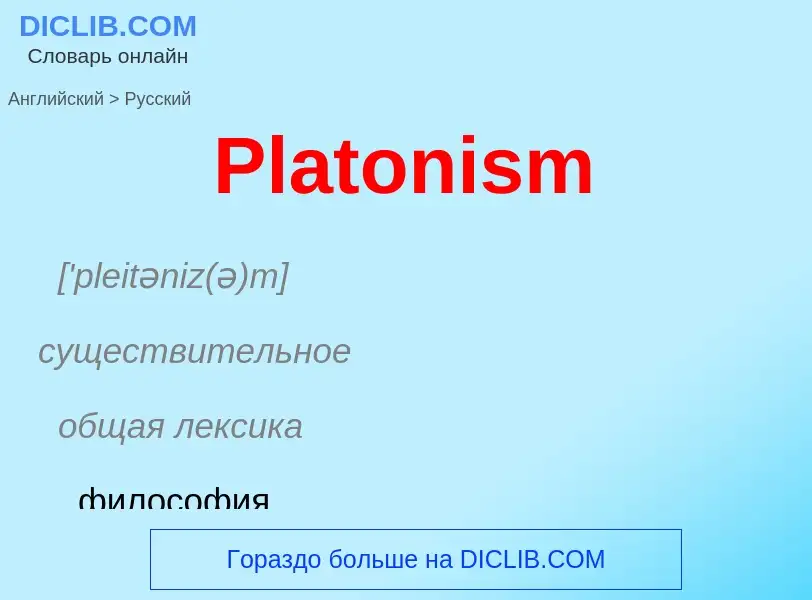Traducción y análisis de palabras por inteligencia artificial ChatGPT
En esta página puede obtener un análisis detallado de una palabra o frase, producido utilizando la mejor tecnología de inteligencia artificial hasta la fecha:
- cómo se usa la palabra
- frecuencia de uso
- se utiliza con más frecuencia en el habla oral o escrita
- opciones de traducción
- ejemplos de uso (varias frases con traducción)
- etimología
Platonism - traducción al Inglés
['pleitəniz(ə)m]
существительное
общая лексика
философия
учение Платона
учение о платонической любви
платоническая любовь
Смотрите также
['pleitənist]
существительное
общая лексика
последователь учения Платона
сторонник платонической любви
Definición
Wikipedia

Platonism is the philosophy of Plato and philosophical systems closely derived from it, though contemporary platonists do not necessarily accept all doctrines of Plato. Platonism had a profound effect on Western thought. In its most basic fundamentals, platonism affirms the existence of abstract objects, which are asserted to exist in a third realm distinct from both the sensible external world and from the internal world of consciousness, and is the opposite of nominalism. This can apply to properties, types, propositions, meanings, numbers, sets, truth values, and so on (see abstract object theory). Philosophers who affirm the existence of abstract objects are sometimes called platonists; those who deny their existence are sometimes called nominalists. The terms "platonism" and "nominalism" also have established senses in the history of philosophy. They denote positions that have little to do with the modern notion of an abstract object.
In a narrower sense, the term might indicate the doctrine of Platonic realism, a form of mysticism. The central concept of Platonism, a distinction essential to the Theory of Forms, is the distinction between the reality which is perceptible but unintelligible, associated with the flux of Heraclitus and studied by the likes of science, and the reality which is imperceptible but intelligible, associated with the unchanging being of Parmenides and studied by the likes of mathematics. Geometry was the main motivation of Plato, and this also shows the influence of Pythagoras. The Forms are typically described in dialogues such as the Phaedo, Symposium and Republic as perfect archetypes of which objects in the everyday world are imperfect copies. Aristotle's Third Man Argument is its most famous criticism in antiquity.
In the Republic the highest form is identified as the Form of the Good, the source of all other Forms, which could be known by reason. In the Sophist, a later work, the Forms being, sameness and difference are listed among the primordial "Great Kinds". Plato established the academy, and in the 3rd century BC, Arcesilaus adopted academic skepticism, which became a central tenet of the school until 90 BC when Antiochus added Stoic elements, rejected skepticism, and began a period known as Middle Platonism.
In the 3rd century AD, Plotinus added additional mystical elements, establishing Neoplatonism, in which the summit of existence was the One or the Good, the source of all things; in virtue and meditation the soul had the power to elevate itself to attain union with the One. Many Platonic notions were adopted by the Christian church which understood Plato's Forms as God's thoughts (a position also known as divine conceptualism), while Neoplatonism became a major influence on Christian mysticism in the West through Saint Augustine, Doctor of the Catholic Church, who was heavily influenced by Plotinus' Enneads, and in turn were foundations for the whole of Western Christian thought. Many ideas of Plato were incorporated by the Roman Catholic Church.



![Many Western churchmen, including [[Augustine of Hippo]], have been influenced by Platonism. Many Western churchmen, including [[Augustine of Hippo]], have been influenced by Platonism.](https://commons.wikimedia.org/wiki/Special:FilePath/Sandro Botticelli 050.jpg?width=200)
